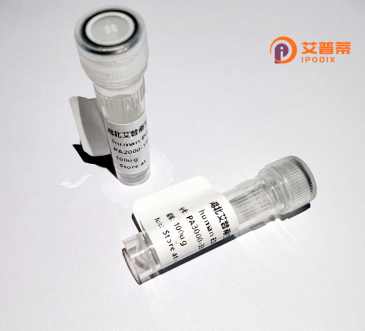
| 纯度 | >90%SDS-PAGE. |
| 种属 | Human |
| 靶点 | FBXW5 |
| Uniprot No | Q969U6 |
| 内毒素 | < 0.01EU/μg |
| 表达宿主 | E.coli |
| 表达区间 | 1-566aa |
| 氨基酸序列 | MDEGGTPLLP DSLVYQIFLS LGPADVLAAG LVCRQWQAVS RDEFLWREQF YRYYQVARDV PRHPAAMSWY EEFQRLYDTV PCVEVQTLRE HTDQVLHLSF SHSGYQFASC SKDCTVKIWS NDLTISLLHS ADMRPYNWSY TQFSQFNKDD SLLLASGVFL GPHNSSSGEI AVISLDSFAL LSRVRNKPYD VFGCWLTETS LISGNLHRIG DITSCSVLWL NNAFQDVESE NVNVVKRLFK IQNLNASTVR TVMVADCSRF DSPDLLLEAG DPATSPCRIF DLGSDNEEVV AGPAPAHAKE GLRHFLDRVL EGRAQPQLSE RMLETKVAEL LAQGHTKPPE RSATGAKSKY LIFTTGCLTY SPHQIGIKQI LPHQMTTAGP VLGEGRGSDA FFDALDHVID IHGHIIGMGL SPDNRYLYVN SRAWPNGAVV ADPMQPPPIA EEIDLLVFDL KTMREVRRAL RAHRAYTPND ECFFIFLDVS RDFVASGAED RHGYIWDRHY NICLARLRHE DVVNSVVFSP QEQELLLTAS DDATIKAWRS PRTMRVLQAP RPRPRTFFSW LASQRR |
| 分子量 | 63.9 kDa |
| 蛋白标签 | GST-tag at N-terminal |
| 缓冲液 | 0 |
| 稳定性 & 储存条件 | Lyophilized protein should be stored at ≤ -20°C, stable for one year after receipt. Reconstituted protein solution can be stored at 2-8°C for 2-7 days. Aliquots of reconstituted samples are stable at ≤ -20°C for 3 months. |
| 复溶 | Always centrifuge tubes before opening.Do not mix by vortex or pipetting. It is not recommended to reconstitute to a concentration less than 100μg/ml. Dissolve the lyophilized protein in distilled water. Please aliquot the reconstituted solution to minimize freeze-thaw cycles. |
以下是关于重组人FBXW5蛋白的参考文献及其摘要概述:
1. **文献名称**:*FBXW5 regulates centrosome dynamics and cell cycle progression by targeting CP110 for degradation*
**作者**:K. Y. Choo et al.
**摘要**:该研究通过重组人FBXW5蛋白的体外实验,揭示了FBXW5通过泛素化降解中心体蛋白CP110.调控细胞周期进程和有丝分裂的分子机制,强调了其在维持基因组稳定性中的作用。
2. **文献名称**:*Structural and functional analysis of the FBXW5-SCF complex in ubiquitin ligase assembly*
**作者**:T. Nakamura et al.
**摘要**:作者解析了重组人FBXW5蛋白与SKP1-CUL1复合物的晶体结构,阐明了FBXW5作为SCF泛素连接酶底物识别元件的结构基础,并验证了其与特定底物结合的保守结构域。
3. **文献名称**:*Recombinant FBXW5 modulates mTOR signaling through interaction with Raptor in cancer cells*
**作者**:J. Li et al.
**摘要**:研究利用重组人FBXW5蛋白,证明其通过结合mTOR通路的关键蛋白Raptor,抑制癌细胞自噬和增殖,为靶向FBXW5的肿瘤治疗提供了潜在方向。
4. **文献名称**:*FBXW5 mediates non-canonical ubiquitination in neuronal development*
**作者**:M. Patel et al.
**摘要**:该研究通过重组蛋白表达和神经元模型,发现FBXW5通过非经典泛素化修饰调控轴突导向蛋白DISC1的稳定性,影响突触形成和神经发育功能。
---
以上文献从结构、细胞周期、疾病通路及神经发育等角度,概述了重组人FBXW5蛋白的功能机制。实际引用时请核对原文准确性。
Recombinant human FBXW5 protein is a genetically engineered form of the FBXW5 (F-box/WD repeat-containing protein 5) protein, which belongs to the F-box protein family. These proteins function as substrate-recognition components of SCF (Skp1-Cullin-F-box) ubiquitin ligase complexes, playing critical roles in the ubiquitin-proteasome system by targeting specific proteins for degradation. FBXW5 contains an F-box domain for binding Skp1 and WD40 repeats for protein-protein interactions. It is implicated in regulating cellular processes such as cell cycle progression, apoptosis, and mitochondrial dynamics by mediating the degradation of substrates like MAP1B (microtubule-associated protein 1B) and MARCH5 (membrane-associated RING finger protein 5). Dysregulation of FBXW5 has been linked to neurological disorders, cancer, and metabolic diseases. Recombinant FBXW5 is typically expressed in prokaryotic (e.g., *E. coli*) or eukaryotic systems (e.g., HEK293 cells) with affinity tags (e.g., His-tag) to enable purification and functional studies. Its production facilitates investigations into substrate specificity, molecular pathways, and potential therapeutic targets. Current research focuses on elucidating its role in mitochondrial quality control and neurodegenerative conditions like Parkinson’s disease.
×